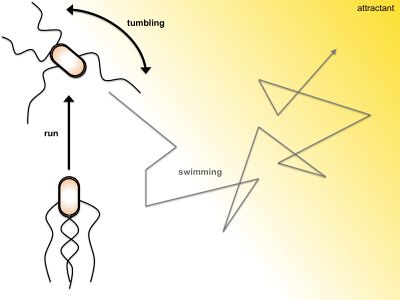Bacteria Game - How to
Prepare the agar with nutrient powder and fill it up with water, following the enclosed protocols. Boil the media in your microwave until the mixture turns clear and the seems to be completely dissolved. Let it cool down to approx. 50°C. Plates for the challenge have to be poured with 35 ml. The mixture can be supplied with antibiotics and inducers. Feel free to establish your own procedures. It turned out to be most precisely to inoculate by carefully pipetting 3 μl of liquid culture into the solidified agar. Nevertheless, swarm plates can also be inoculated by transferring a bacteria colony using a tooth-pick which can be found in the game kit. Swarm plates are ordinarily incubated at room temperature.
E. coli cells with a functional chemotactic system swarm (= “swim”) on soft agar plates. The field of chemotaxis is perspicuously defined. Studies deal with migration depending on chemicals. To be more precise: cells sense the presence of diverse substances in their environment and respond to gradients of chemical attractants or repellents by moving. The bacteria spread radially due to the attractant gradients formed by metabolizing the different nutrients in the agar. Swimming of the cells can be described as a biased random walk in a spatial gradient of media. The microbe runs in favorable directions towards high concentrations of attractant (i. e. nutrient) and away from repellents (i. e. antibiotic). Straight runs are only interrupted by short tumbles where the cell reorients randomly for the next run. The probability for tumbling increases with higher repellent concentrations. Likewise the tumbling frequency rises during runs down attractant gradients (see figure on the right). As a result, the cell almost swims along curly trajectories.
Limitations
- “culturing” / “breeding” meaning selection of best swarmers
- evolutionary effect on molecular level (i. e. signal network properties)
- training effect has to be experimentally determined, since it is still unknown here
